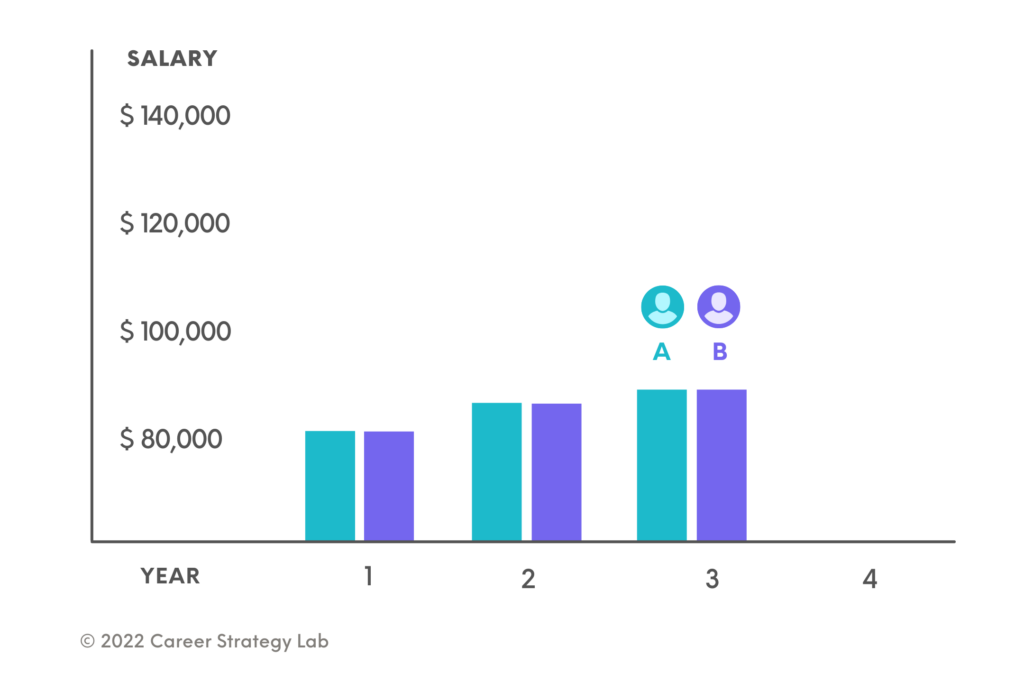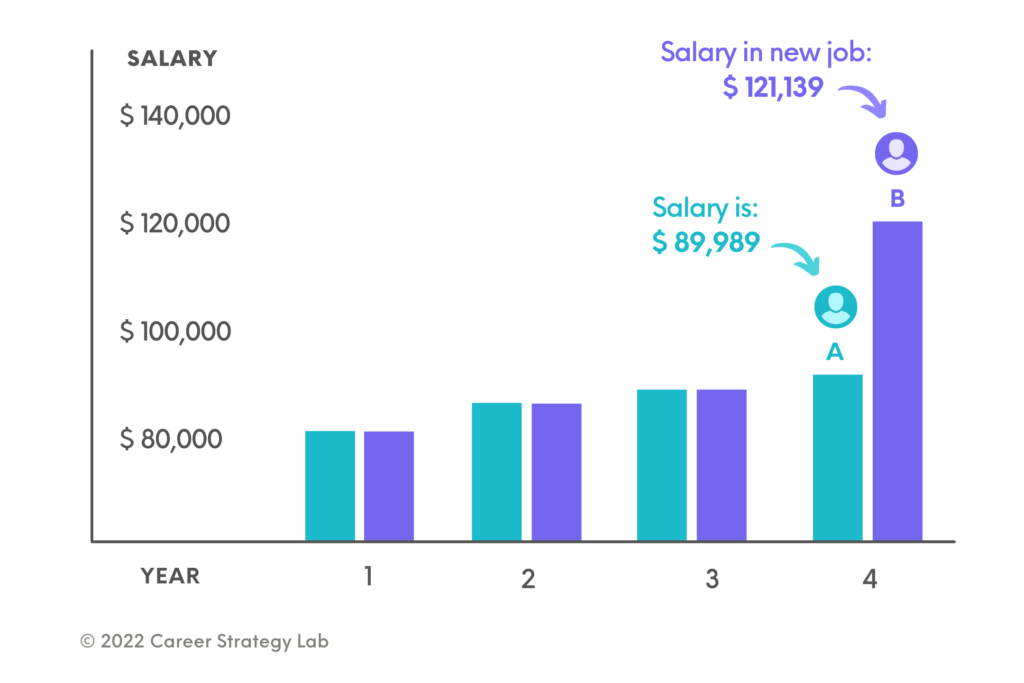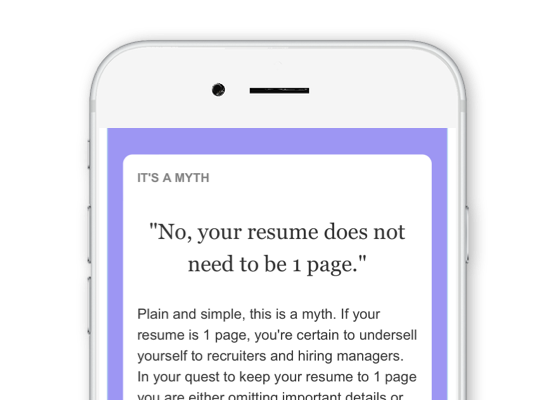9 min read
Why Staying in a Job For Too Long Can Hurt Your Salary and Career
8 min read
8 min read

It’s common knowledge that job hopping can be a yellow flag for recruiters and hiring managers. When you frequently switch jobs, people may start to wonder why this is happening and question your skills and abilities. But staying in a job for too long also has the potential to hold you back professionally, and it’s not just related to advancing your job title, skills, or experience.
When you stay in a job for too long and continue to do the same thing year after year eventually you’ll likely get bored and you’re skills and experience will reach a plateau. As technology impacts many roles today, being fluent in the latest tools, software, etc is crucial to your employability in the future. Employers may also think you have a more narrow range of skills, experience, and perspective than someone who’s spent a few years at different companies.
Beyond the skill plateau though is a bigger problem – your salary will plateau as well.
Staying in a Role For Too Long Can Hurt Your Salary
The idea that loyalty will be rewarded in the form of promotions and pay increases is a thing of the past. What most employees don’t realize is that staying at a company or in a job for years and years doesn’t always result in the recognition and compensation they imagine they’ll be given.
According to a survey about salary budget growth conducted by Salary.com reports that most U.S.-based companies are growing their salary merit-increase budgets by 5 percent or more, up from the previous longstanding average of 3 percent. Salary.com conducted the survey of 1000+ organizations in June of 2022. The jump from 3 to 5 percent is attributed to companies adjusting for cost of living increases and the desire to retain employees who might be thinking of leaving to pursue roles with more flexibility or opportunities to work remotely.
Although a 5 percent salary increase might sound good, what most candidates don’t realize is they might be able to garner a much higher salary if they sought out a role at a different company. The Pew Research Center reported that from April 2021 to March 2022, half of the workers who changed jobs experienced a pay increase of 9.7 percent or more than their salary the year prior.
In our career coaching program, our clients routinely see salary increases of 10, 20, 30, and higher for people who’ve already working in tech as well as those switching into the tech industry. This is why staying in a job for too long can stunt your salary and your skill set.
Switching Jobs Can Increase Your Salary and Future Earning Potential
Let’s consider a scenario where two people start working at the same company at the same time to visualize why staying in a job for too long can plateau your salary and how switching jobs can help you increase your salary. In each of their first three years on the job, they earn a salary increase of four percent. At the end of the third year, they’ve both seen their salaries increase by the same four percent year after year. This is where things get interesting. Let’s break down what happens to each of these employees individually after year 3 based on some strategic decisions that one of them decides to make.

First, consider Person A. This employee decides to stick around, focusing on that familiar loyalty model. Once again, they earn a four percent salary increase in their fourth year. Person B isn’t exactly unhappy at work, but they’re curious about what else is out there. After some research, they take a few interviews, during which they learn that they are being underpaid in their current role. They are offered a new job, along with a 40 percent increase from their former salary at the original company.
The bottom line is that Person A stayed the course and was rewarded only marginally, while Person B took a risk and saw a much larger payoff.

We’re not just dealing with hypotheticals here. Our career coaching clients change jobs and career paths all the time, and they often increase their salaries in the process. Recently, one of my clients took my advice on this subject and nearly doubled their salary. They stood their ground in financial negotiations and now feel confident that they are being compensated fairly according to their qualifications and expertise.
To Know Your Earning Potential, You Must Take a Chance on Yourself
Seeking out a new professional opportunity and switching jobs can be challenging. There’s something to be said for the familiarity of your current organization and knowing that your current manager and team value your skills and experience. Maybe you really enjoy working with your colleagues, feel passionate about your function on the team, and like the safety of seeing small rewards on a regular basis. Maybe you take a lot of pride in company loyalty. Maybe you don’t want to risk the frustration or disappointment of getting into a new — possibly less comfortable, rewarding, or consistent — situation simply to avoid a salary plateau. There’s nothing wrong with being comfortable.
However, you’ll never know how another company would value your skills and experience unless you seek it out. It’s impossible to know what’s available to you at a higher salary if you don’t take a chance and put yourself out there.
On the other side of your fears of rejection, your concerns about navigating a job search and uncertainty about a new company, you might just find more than you can even imagine.
The Impact of Your Salary and Compound Interest in Your Career
If you get hired at another company and earn a higher salary, there are a number of short and long-term benefits beyond just your new salary. You have to look beyond your paycheck and look to the future to see how a higher salary will set you up financially decades from now. Think about your salary in terms of compound interest. If you manage your money wisely, your higher salary has the potential to change the trajectory of your financial well-being and your life. Let’s look at a few of the benefits of a higher salary and how the concept of compound interest in your career and salary applies to each.
- You can increase your savings. With more money coming in every month, you can bank more for practicalities like retirement or education. You might even be able to save up for that fun vacation or big indulgence that has been off-limits until now.
- You can pay off debt. Debt is always on your mind, at least a little bit. A salary bump will allow you to pay off your debt faster, which is good for your credit score and your mental health.
- You increase your earning power for the future. The higher your salary is now, the higher you can expect your starting salary to be at other jobs down the road. Plus, you’ll get more comfortable making these moves and asking for what you deserve.
- You might even like the job more! Sure, there’s a risk, but once you take the leap, you might find that seeking a new opportunity yields rewards beyond the financials. A new job might give you the chance to cultivate new skills, meet fantastic people or develop a passion for a new mission.
It’s never a good idea to make a big career change without thinking it through, but if you do find yourself hitting a salary plateau or feeling unsatisfied at the office, I encourage you to at least start the process of researching other job opportunities.
Take control of your own career and remain loyal to what’s best for you and your bottom line. It’s unfortunate that loyalty isn’t rewarded as much as it should be. However, it’s important to remember that companies are ultimately out to make a profit and when hard decisions about hiring, salary increases, and promotions need to be made, money has a huge influence. With this knowledge about how and why staying in a job for too long can hurt your salary, you can take matters into your own hands.









